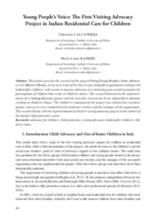Displaying 821 - 830 of 1482
This chapter from Child Maltreatment in Residential Care presents the key findings from the Bucharest Early Intervention Project (2003), a longitudinal randomized control study which revealed the immense developmental impact of the severe deprivation experienced by children placed in institutional care shortly after birth.
This paper provides evidence-based guidance on the use of family interventions involving children with a history of institutionalization prior to their placement in family-based care through foster care, adoption, or reunification with their families.
This study investigated the prevalence of abuse experienced or witnessed by Romanian children living in long-term residential centers in 1999.
This study explored the experiences of maltreatment and outcomes of adult care-leavers in Australia who lived in out-of-home care as children.
This chapter of Child Maltreatment in Residential Care describes Interaction Competencies with Children – for Caregivers (ICC-C), a preventative intervention approach to improve the quality of care and reduce the incidence of maltreatment within institutional care settings in Sub-Saharan Africa.
This study analyzed the experiences of victimization by peers and staff of adolescents living in Israeli residential care settings.
This study observed the physical growth and cognitive development in institutionalized toddlers in India, finding profound developmental delays in the sample group.
This chapter of Child Maltreatment in Residential Care describes the history of child care institutions in the Russian Federation and the legislative changes implemented to improve the situation of children living in residential care settings.
This article presents the research of the project "Giving Young People a Voice: Advocacy in Children’s Homes," which evaluated the implementation of a visiting advocacy project and services provided by an independent advocate working in children's homes in Italy.
In this video, Philip Goldman, President of Maestral International, discusses how donors, faith communities, advocates and other committed actors can be brought together under the common belief that all children belong in families.

